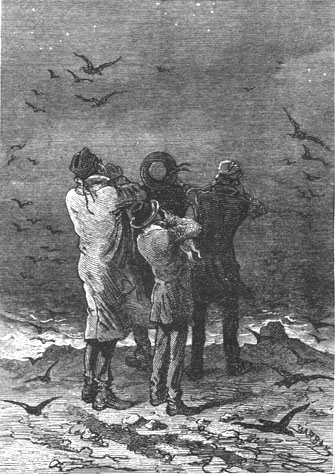Greetings all and welcome to the first session of the NonPro Book Club! This month we’ll be taking a look at a classic scifi novel, “The Mysterious Island” by Jules Verne. As always, you are invited to pick up the book and read along, and join us in weekly discussions in the comments below as we post about what we’ve read thus far.
As this is our first assignment, let’s take a look at the first five chapters of the book and discuss our initial thoughts.
A word on Verne
Whenever I read any “period” author, I try to read the book from the perspective of a contemporary reader of the time the work first came out. I’m not saying that I dress in chaps and monocles and cosplay a Victorian (I do, but that’s not why I do) I simply attempt to enjoy the work on its own merits, divorced from the evolution of the genre, language, and social mores. In the age of From Dusk to Dawn and Underworld it is easy to say that Dracula and Nosferatu didn’t have nearly as much “cool stuff,” but I think you do yourself a disservice not acknowledging our roots.
This is especially true when it comes to science-fiction, and one of the earliest masters, Jules Verne. As soon as the book opens, we see some of what Verne is famous for: detailed description of advanced technology (the air balloon), strong essential characters pulling us through a genre-heavy narrative, and a scientific outlook on natural and para-natural phenomena. Immediately, our heroes are sinking in their new-fangled air ship, descending ever closer to a treacherous foreign sea, and we are being told about a storm that all us readers should remember, complete with dates and ranges, as if Verne were recounting an actual historical weather pattern or as if he set his island adventure story during a recent well-reported typhoon. Authors today sometime call this “world building” or “layering” and it is meant to add a sense of realism and depth to a otherwise fictional tale – and Verne does this so well you can’t be certain that it wasn’t set during an actual storm.
Our Castaways
We mentioned before that the elements of “The Mysterious Island” strangely parallel things that occurred in another famous work set on a… well, mysterious island; the TV show Lost. Hopefully, we won’t annoy you guys too much by constantly harping on these imagined similarities, and we don’t want to create a bar to the discussion by referencing a series that not all of us have watched, but it is well worth the occasional reference.
Verne starts the story off mid-crash, as we find one of our main characters (the hero, in fact) hurled off as everyone else becomes stranded on the beach of a strange island. In the second chapter, Verne is already introducing us to our cast of castaways by way of a flashback to before their fateful flight. Yes. A flashback.
What I love most about this is Verne’s use of language; his laments, how he nearly makes reference to the fates and the gods and providence and mercy and the deus ex machina! It’s like listening to a Victorian-age Greek-chorus narrating the unwritten intro to a Lost flashback. It’s great because modern storytelling techniques are all about the abrupt cut and the “you-didn’t-know-what-you-were-reading-or-watching-was-set-twenty-years-in-the-past” thing, but at this time in literature Verne was explaining to his audience that he was taking them back to a time before all this tragedy happened.
For the steam-punk lovers out there, we do not disappoint. Our castaways are a hardened crew of honorable Northern soldiers from the American Civil War and range from a man of letters to a wise sailor to a brilliant genius. Rounding out our cast we have a young and adventurous boy (soon to become typical in genre novels aimed at youths) and a stock character whose use has somewhat declined in recent “more enlightened” times, the loyal negro servant/equal-despite-somehow-seeming-a-lesser.
Oh, and did I mention that there was a dog? Nope. No more Lost references from me. I promise.
Adventure Novels and Learning to Build a Fortress from Coconuts
What I absolutely love in adventure novels, specifically ones set on strange islands with castaways lost to the world, is how our heroes learn to make due with the basics that the island provides them. It sings to my Do-It-Yourself nature and desire to runaway from it all and start my own military-industrial complex forged from palm trees and indigenous monkeys. From the harrowing survival journey of Robinson Crusoe to the crazy Rube Goldberg tree in The Swiss Family Robinson man versus nature is a staple in these stories (see also, Survivorman and related reality shows). In these first few chapters, we get the initial glimpse of how our heroes will attempt to bring civilization to their island home, and for the record… this novel is not vegan friendly.
“Then let us eat some lithodomes. And by that I mean let’s devour this species off the hell-damn planet.”
Oh brother!
Still, a solid exciting start to our story filled with island survival, daring escapes, and a hot-air balloon crash! Fun stuff!
But what do you think? Join the discussion in the comments below, and remember to read the next five chapters for next week!

